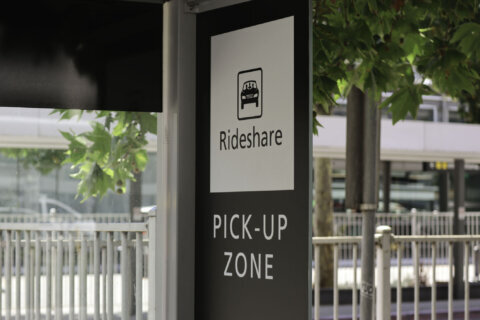This summer, WTOP is taking you on a tour and exploring how adults 50 and older are spending their travels.
They may not be doing it for the ‘Gram, the likes or their followers, but older adults are visiting top travel destinations, and they’re not letting recent inflation get in the way of checking items off in their bucket lists.
“Don’t wait,” said Sally Matts, of Waldorf, Maryland. “Don’t think you can keep putting things off, because you never know.”
Matts, 71, has become an avid traveler since her retirement. She is a Road Scholar travel ambassador who has been on nine trips planned by the nonprofit organization, which provides education travel programs for those 50 and older. With an upcoming trip to Spain this fall, Matts is among older adult travelers who plan to take trips, despite inflation limiting some globe-trotters.
Matts agreed that travel has always been expensive, but she believes that even when inflation subsides, prices won’t go down dramatically.
Why more older adults are traveling

A recent AARP survey found that many adults 50 and older said they felt comfortable traveling again after the COVID-19 pandemic, but they also said that they couldn’t afford to because of “rising inflation and high costs.”
The online survey of 2,000 Americans age 18 and older was conducted in November and December of 2022.
Some 52% of respondents said they are limiting their travel because of cost, and 27% said financial concerns due to inflation are making them think twice about taking a vacation, with half saying their plans to travel more had changed because of it.
“Those are big barriers to people who want to kind of get out there and start traveling,” said Patty David, vice president of Consumer Insights at AARP, which is headquartered in the District.
“With the costs being up … the unknowns and the fear of what’s happening around inflation, those are our big things with what’s going on in the travel world, and barriers to them being able to travel.”
Matts said she has met some people who are saving money and have had to postpone travel plans until they have enough in their travel budget. Airfares are at record highs since 2022, when the average cost was 22% higher than the average before the pandemic, NerdWallet said. It’s the same for lodging prices, car rentals, restaurants and entertainment costs.
- ‘See the world just like anybody else’: Disability, chronic disease not keeping older travelers from taking off
- Solo trips or ‘gramping?’ How older adults travel is changing
Every country in the world is experiencing growth in size and proportion of older persons in the population, the World Health Organization said. By 2030, 1 in 6 people worldwide will be 60 years old or older — some 1.4 billion — and by 2050, that number will double.
People are also living longer. The number of persons aged 80 or older is expected to triple between 2020 and 2050, reaching 426 million, the World Health Organization said. In a 2017 study, credit card company Visa said that the number of international travel per year by people 65 and older will double by 2025.
CBS News travel editor Peter Greenberg said the current senior traveler is more physically active compared to the typical older adult traveler 20 years ago. Older adult travelers today are spending their money on experiences and not on material items.
“They’re not buying new cars or jewelry or clothing or expensive electronic items. They want to buy experiences, and that’s where they’re spending their money — it’s travel,” Greenberg said.
Where they’re going
Despite the high cost, the desire to travel is there, but older adults are shifting how they’re going to spend their money to stretch it out a bit more.
“They are looking at more domestic trips instead of international trips. They’re using their personal vehicles instead of going by air,” David with AARP said. They are also staying at cheaper lodging or with family and friends.
“It’s not necessarily stopping them. But it’s making them think differently about how they’re going to travel and what they’re going to do,” David added.
The AARP survey found that those 50 and older plan to spend about $6,700 in 2023 and anticipate about four trips for the year. Those younger said they planned to spend about $5,000. A Forbes survey had that number even lower with 49% of respondents saying they planned to spend $4,000 or more on travel.
Older adults are flocking to Florida, California and Las Vegas this summer. Internationally, they want to go to Italy, Great Britain, France, Latin America, the Caribbean and Mexico, the AARP survey found.
The types of trips that adults 50 and over are taking are typically family trips.
“A majority of them are hanging out at the theme parks, going to the beach, doing family stuff and family gatherings,” David said, adding that gambling, concerts and visiting historical sites “are areas that they’re going to, and those are the biggest kind of themes and stuff within the areas that they’re interested in.”
Thinking differently about travel
Greenberg said European destinations are no longer the usual suspects for older adult travelers. It’s all about showing off.
“They want to go to places where they can impress their friends,” Greenberg said. “They’re breaking out; they’re going to places in the South Pacific; they’re going to places in Africa. Africa is big for seniors right now.”
It’s not just about taking in the sights, either.
“They want to go rafting on the rivers in Uganda. They wanted to see the pyramids in Cairo, (but) they want to go do some other interesting things in the rest of Egypt. They’re much more keen for exploration, and they’re much more keen to immersion on a cultural level,” Greenberg said.
That’s because they have the time, money and the interest, he added.

Whereas travel restrictions and reluctance to leave the U.S. led to people spending money on physical goods instead of experiences during the height of the pandemic, airlines have been making improvements in anticipation of a busy summer travel season.
Greenberg said that the pandemic triggered a shift in how people looked at life, as well.
“Many people either got (COVID-19) or knew people who got it and didn’t survive, and it changed the way they looked at life. There was a ticking clock at that point, and they said, ‘You know what, I don’t need material items. I want to go out there and get experiences, and I want to see something that I didn’t see before,'” Greenberg said.
It took a while, but the international programs at Road Scholar have been selling off the shelf, said public relations director Kelsey Knoedler Perri.
“I think COVID showed all of us that travel can be taken, the ability to travel can be stolen from you at any point, whether it’s because of a global pandemic, or it’s because you get injured or you’re getting older,” Perri said, adding that there’s a renewed sense that “we seize the moment and see the world when we can.”
‘Every day is a vacation when you’re retired,’ but Gen X hasn’t crossed that ‘finish line’
A Bankrate survey conducted between March 29 and March 31 found that while overall affordability is the top reason respondents said they were not planning a summer vacation in 2023, 69% of Generation X and 59% of baby boomers overwhelmingly cited cost as a barrier, followed by millennials at 52% and Generation Z at 47%.
“Gen Xers really stood out,” Bankrate senior industry analyst Ted Rossman said, which he attributes to those who are between 43 and 57 years old being in the “sandwich generation.”
Rossman said Gen Xers are “living expensive years” and maybe taking care of elderly parents, while at the same time supporting their own children through expensive years that include college.
In addition, Gen Xers are also getting close to that “finish line,” where retirement is approaching and they feel like they may not be fully prepared. “That makes them nervous,” Rossman said.
A recent Prudential Financial survey found that 35% of the 65 million members of Generation X in the U.S. have less than $10,000 saved in a retirement account, and 18%, or around 12 million people, have no savings whatsoever.
As for those 58 to 77 years old, health and advancing age play a role in why they are not planning to travel. But there could also be waning interest as some survey respondents told Bankrate.
“Everyday is a vacation when you’re retired,” Rossman said.
But there are some baby boomers in the survey who said that they are less likely to cut back and will spend money on travel. Rossman said the conflicting attitude may be attributed to being more financially secure.
Matts, the avid and active traveler, said that inflation is an issue for a lot of people, and she is fortunate that she has enough money and time to be able to travel.
“The unfortunate thing was my husband passed away when he was in his early 60s, and I was still working. I feel bad that I can’t be traveling with him,” Matts said, adding that she wished that they had traveled more and done the trips she has been taking with Road Scholar together.
“Don’t keep putting it off,” she added.
Tips for traveling on a budget
With so many people clamoring to get out and travel, Rossman, with Bankrate, said that it’s very much a “sellers’ market” and that the work of the travel industry is essentially being done for them, when it comes to attracting customers.
“We are seeing some incentives on things like cruises. That’s one that has been a little slower to recover,” Rossman said. But as for hotel or airline discounts or extras, he said “we’re not seeing a lot,” and in many ways, travelers are paying more but getting less.
Rossman said that there’s no time like the present to use credit card reward points.
“A lot of people are sitting on real value in terms of credit card points, airline miles, hotel points — these things are not going to get more valuable over time. In fact, they lose value over time to inflation and program changes,” Rossman said.
Another neglected source is unused gift cards, which Rossman said that many Americans have an average $175 of gift cards they’re just sitting on.
Letting the deal dictate the destination is another tip.
“Often people plan travel the other way around, and they get their heart set on a specific place at a specific time. And that just boxes you in,” Rossman said.
Being flexible with dates or the destination allows for flexibility and shopping around for cheaper flights, accommodations and activities.
“Maybe go in the offseason or the shoulder season, or fly mid week instead of on the weekend,” Rossman. “Be flexible would be another good overarching tip.”








